The British ambassador’s residence in Washington is an impressive estate known for hosting events with coveted invite lists and well-connected guests. Among other things, it has been the site for the post-advance screening reception of the “Downton Abbey” movie and a garden party celebration of the late Queen Elizabeth II’s platinum jubilee.
But in January, the “palatial” estate staged a social confab atypical for the world of international diplomacy. It was a baby shower. And the honoree was President Joe Biden’s niece, Missy Owens. The affair was complete with pink balloons and drapery and attended by top Democrats Valerie Biden Owens (the president’s sister and mother of Missy, who called it “a lovely day” in an email to POLITICO), Adrienne Elrod, Stephanie Cutter and Liz Allen, among others, according to two attendees.
It was a rarity for the embassy, which has interests of its own before the U.S. government including a potential free trade agreement between the U.K. and the United States. The embassy, as its spokesperson Samuel Heath noted, “holds a range of events, which have included afternoon teas, receptions and exhibitions, to showcase the UK but also to bring together friends of the Embassy.” Ahead of the White House Correspondents’ Association dinner Saturday, it hosted a joint event Thursday at its residence with POLITICO.
“We’re proud to have such a diverse range of friends and contacts across Washington and the whole of the United States,” Heath said.
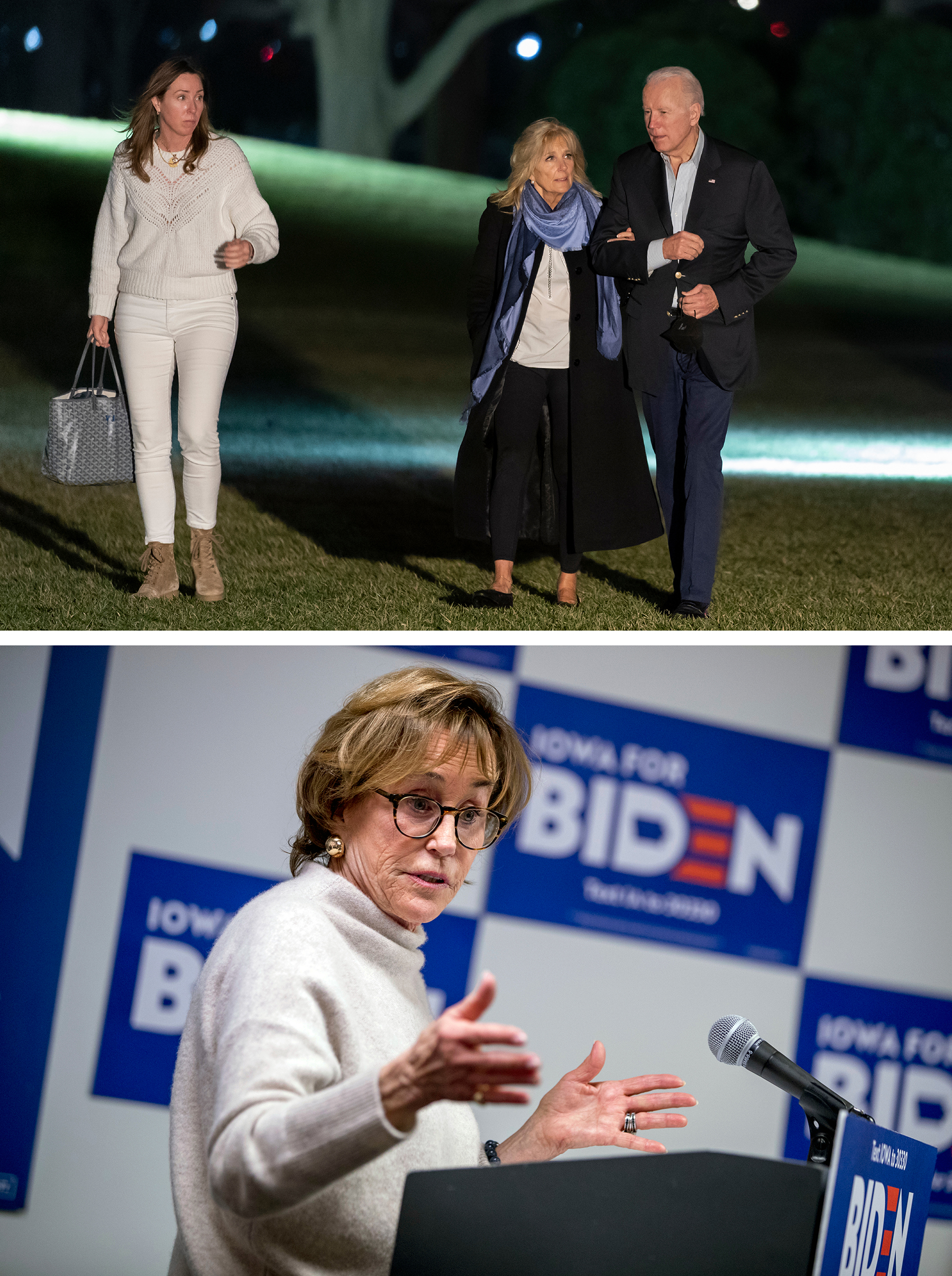
The embassies, which are hosting droves of partygoers this week for festivities around the White House Correspondents’ Dinner, have historically operated somewhere on the spectrum between diplomacy and lobbying. They exist first and foremost to do their government’s bidding. But if a measure of goodwill between nations can be achieved in the course of a good party, all the better.
Boisterous embassy parties predate Benjamin Franklin’s memorable stint as a U.S. envoy to 18th-century Paris. What’s notable these days, at a time of stark partisan divide, is how the ambassador’s residence or garden is one of the few places in town where electeds and their hangers-on from both parties mix and mingle on neutral ground without a second thought.
And it offers an opening to do a soft form of lobbying when the old ways of Washington are under greater scrutiny.
Most of that went away during the pandemic. Since it ended, the embassy scene has been the first social theater to come roaring back — and with this head start, the most socially savvy of D.C.’s diplomatic set are racing to make up for lost time.
They may not admit it — though some do in an honest moment — but it has become apparent that embassies are engaged in a game of festive one-upmanship. The terms are pretty straightforward: The more head-turning the event, the better the odds of landing bold-faced names.
Among the tools highlighted in party invitations and interviews with embassy officials were music made by icicle instruments at the Norwegian embassy, stuffed animal corgis (a favorite of the last queen) at the British embassy, and, at the Finnish embassy, saunas where diplomats, politicians and journalists (including, on occasion, some from POLITICO) strip down and sweat alongside each other.
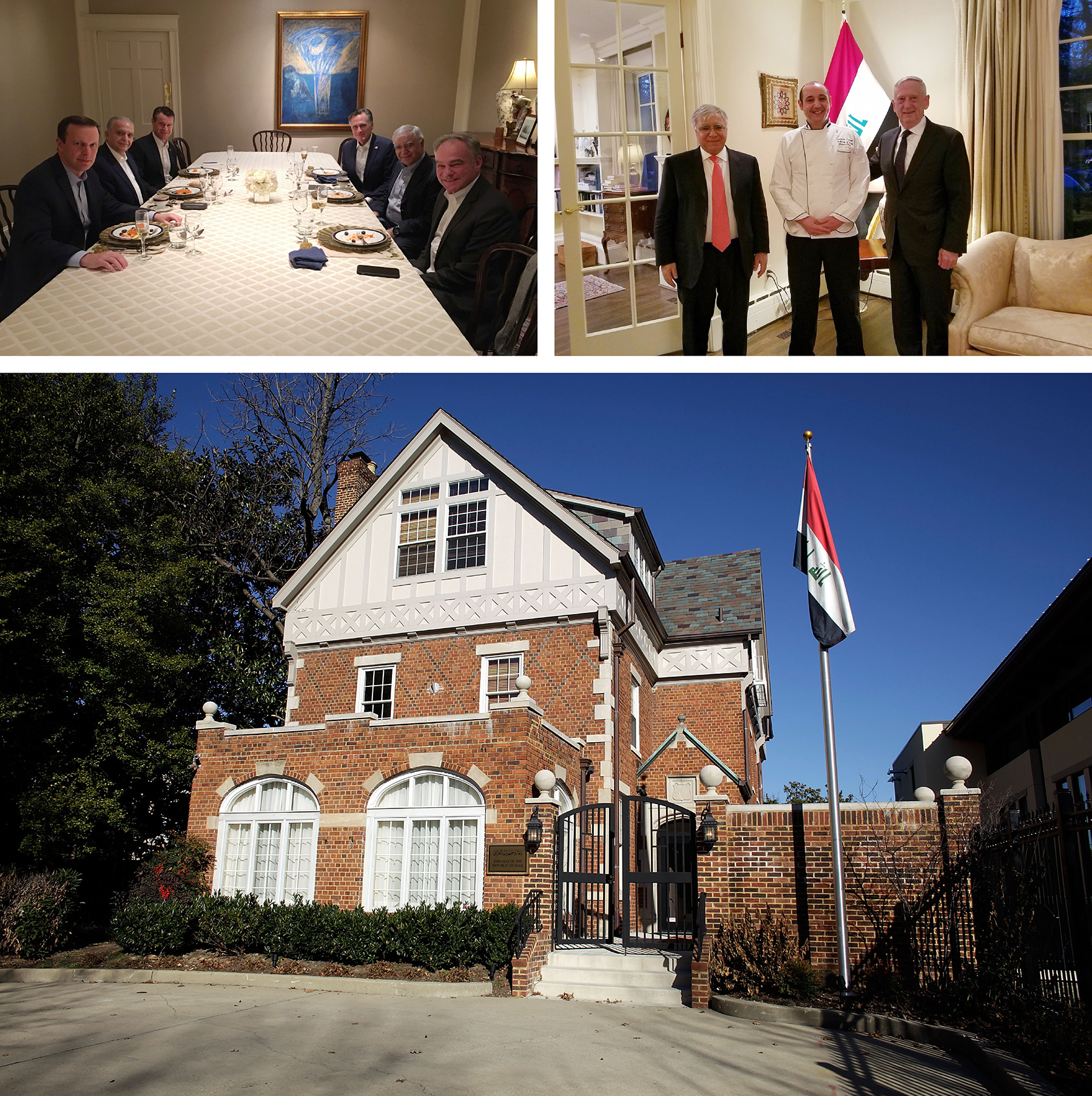
Different embassies have different agendas. Some have limited interests before the U.S. government and the events they throw appear designed as a way of exchanging information and building relationships. Others have much to gain from face time with political power players, making the events look more like blatant plays for access.
Often, the hosting countries have lobbyists, lawyers or PR firms on retainer for their business around the U.S. And lobbyists or consultants often help put together events at which top administration officials and members of Congress are guests. Even Supreme Court justices have made appearances.
“Obviously the embassies want to attract people who can help their country, that’s the point of it, and whatever issues they’re working on, so they always try to have people in government, and it was always a challenge during the Trump years because nobody wanted to sit next to anybody associated with the Trumps,” said journalist and author Sally Quinn, a longtime fixture of the Washington social scene. “It’s very valuable for them to have access to people in the government.”
At the British embassy’s Platinum Jubilee reception honoring Queen Elizabeth last June, Justices Neil Gorsuch and Samuel Alito celebrated alongside senior Biden aide Steve Ricchetti and former Biden White House press secretary Jen Psaki. Guests enjoyed whiskey from Wales, North Ireland and Scotland, along with fish and chips, Yorkshire beef pudding, Scottish salmon and Welsh tea cakes.
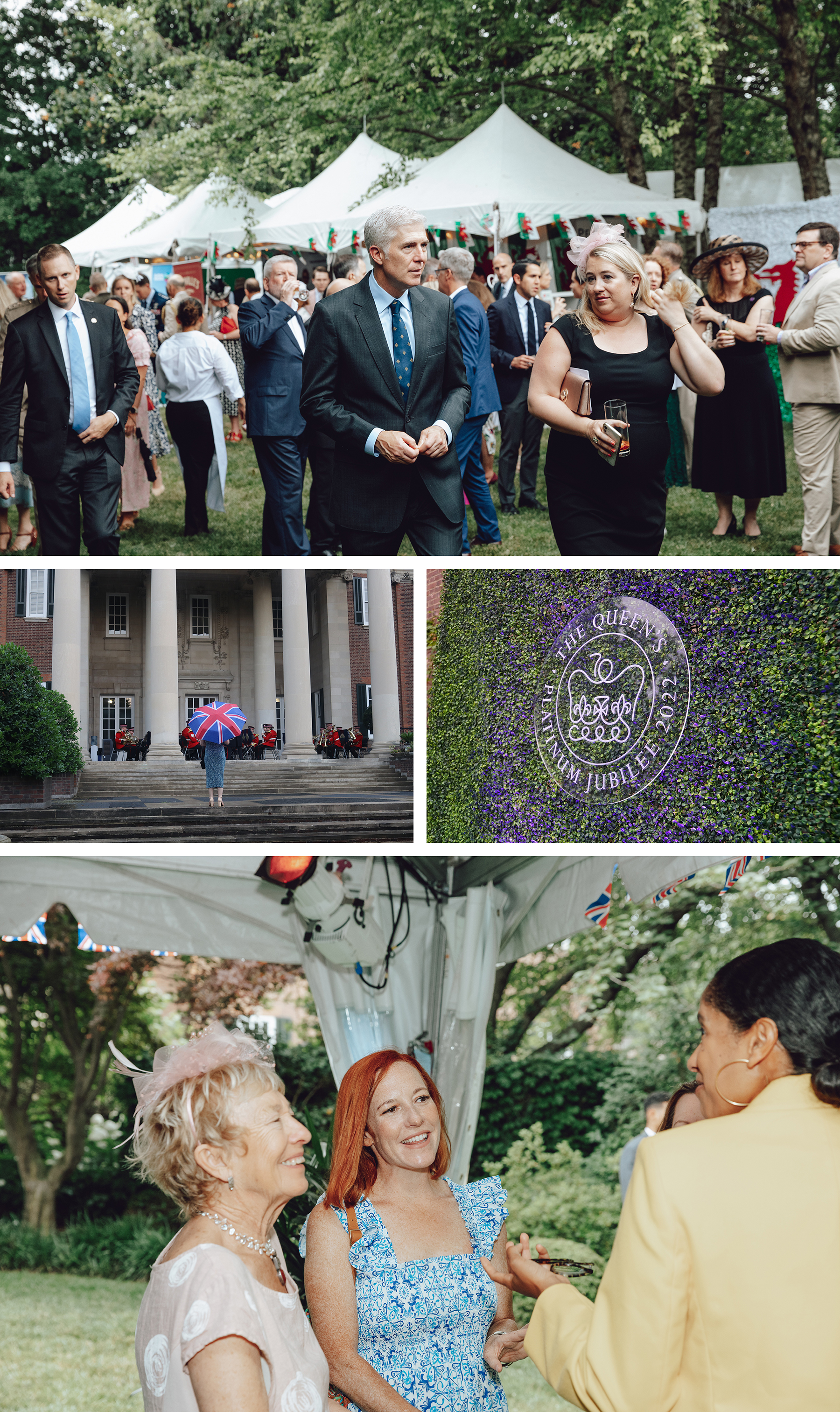
“I think every event, every venue, everything in Washington, D.C., aims to be sorta unique and quirky to get more people to attend,” said one lobbyist who represents foreign governments, granted anonymity because they are not authorized to speak on behalf of their clients. The lobbyist explained that these kinds of events involve an “all hands on deck” approach of event planners, PR firms and lobbyists. “When you’re in the entertainment space you have to have a hook.”
In some ways, the embassy party is better suited for the functions that lobbying shops traditionally handle: Getting VIPs on their home turf, feeding them expensive food and booze and offering them unique experiences. It’s K Street, but with more intimacy.
“Their purpose is very obvious, and that is they are trying to create friends with key government officials and key lawmakers,” said Craig Holman, a money-in-politics lobbyist for the government ethics watchdog Public Citizen.
The law that governs foreign influence contains carveouts for diplomatic or consular officers. So if the State Department has recognized a “duly accredited” foreign government’s diplomat, that official generally does not have to file reports to the Justice Department under the Foreign Agents Registration Act for their regular duties.
For lobbyists representing that same country, that law requires detailed and regular filings about their outreach on behalf of foreign governments.
Perhaps no one has recognized the potential for embassy events to connect with the city’s power players more than Yousef Al Otaiba. The longtime UAE ambassador to the U.S., Otaiba has a reputation as one of D.C. society’s most powerful and connected players. And he has used his regal-looking embassy in some unconventional ways to showcase his country.
The embassy hosted a virtual watch party to mark the UAE’s launch of a space probe of Mars in the summer of 2020. And when Francis Suarez, the Republican mayor of Miami and president of the U.S. Conference of Mayors, was in town earlier this year, it hosted a reception for mayors as a way for the country to establish business connections to the cities in attendance.
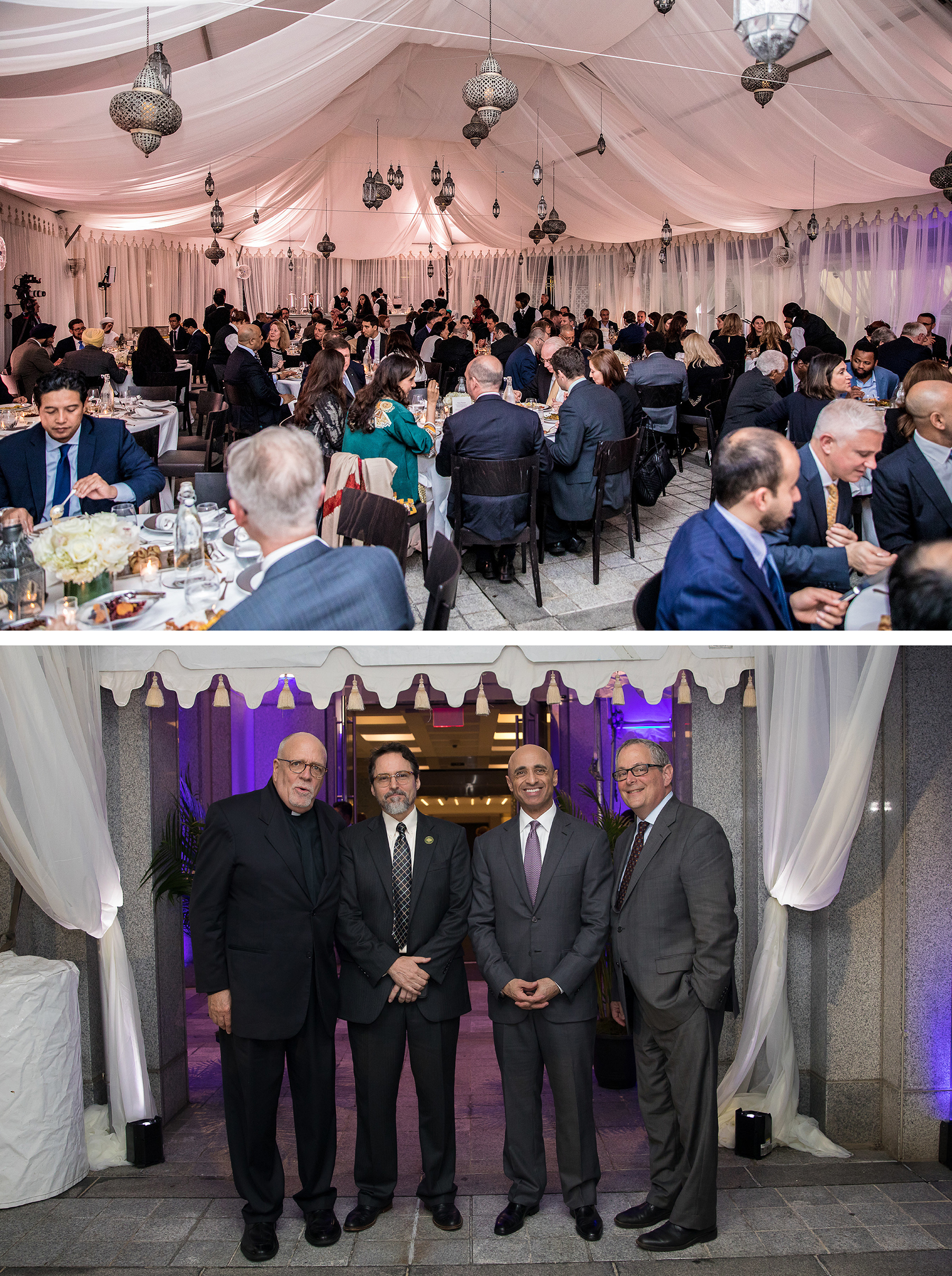
The UAE has myriad interests before the U.S. government, including weapons acquisition, and more than a dozen firms actively registered with DOJ to represent government clients.
Otaiba said his favorite event to host is an interfaith Iftar dinner during Ramadan with Christians, Jews, Sikhs, Buddhists and others. Former Trump Treasury Secretary Steven Mnuchin, former Sen. Roy Blunt (R-Mo.) and Special Olympics Chair Timothy Shriver have all attended the event, which started before the pandemic.
The dinner in late March drew a lineup of prominent Jewish movers and shakers: Rep. Brad Schneider (D-Ill.), Biden antisemitism envoy Deborah Lipstadt, Israeli Ambassador Michael Herzog and Republican wordsmith Frank Luntz. The menu included salmon, saffron chicken, eggplant and beef kibbeh labanieh, and guests received a box of dates from the UAE as a party favor.
“Everybody leaves feeling good after that,” Otaiba said. “It’s about tolerance, it’s about inclusion, all of the values that we represent and stand for in the Emirates.”
Iftar dinners, however, are relatively mundane compared to many embassy shindigs. The French ambassador’s residence in recent years has held an Améthyste event, an homage to the purple stone. Washington bigwigs who attended last year included Sens. Chris Coons (D-Del.) and Sheldon Whitehouse (D-R.I.), senior White House officials Shalanda Young and Mitch Landrieu and Trade Representative Katherine Tai.
The purpose is to bring together Democrats and Republicans, said a French official in Washington who was granted anonymity to discuss the thinking behind the event. But it also hasn’t hidden its connections to K Street influences. Heather Podesta, a mega-lobbyist who that quarter lobbied for companies including Toyota and SpaceX, co-hosted Améthyste in December.
“Any time you put Republicans, Democrats, the media, corporations, nonprofits, entertainment industry, and diplomatic corps in the same room, good things are going to happen,” Podesta said in a statement. “In a town that too often is bifurcated by party, we all need opportunities to know each other better.”
The event’s corporate sponsors included the South Korean conglomerate SK Group and the French investment firm Ardian, which is looking to invest in the U.S., said Steve Clemons, another co-host of the event whose day job is writing a newsletter for the media startup Semafor. Clemons, a familiar face to those operating at the nexus of journalism and the embassy party circuit, became a Chevalier in France’s Legion of Honor in 2021.
In a statement, Ardian did not comment on its involvement in the party. The party also featured Chevron-branded coasters for the energy company, another sponsor. SK Group did not provide a comment. Chevron spokesperson Bill Turenne said in a statement: “Like other brands and news organizations, Chevron is proud to support events in Washington, like Amethyste, that bring Republicans and Democrats together to benefit important charity partners.”

Though denizens of the embassy party circuit say corporate sponsorships date back a number of years, they have at least become more noticeable of late. As part of the festivities around the White House Correspondents’ Association annual dinner, the Swiss commodity company Mercuria is sponsoring Time Magazine’s after-party Saturday night at the Swiss ambassador’s residence.
A representative for Mercuria said in an email: “Mercuria is a Swiss company, so the company often sponsors events at the Swiss embassy. We also sponsor the Soiree Suisse at the Swiss Embassy with other Swiss companies each year.” Spokespeople for the Swiss embassy and Time either declined to comment or did not respond.
One Republican lobbyist said that a company with business with a foreign government or in a foreign country might sponsor an event as a means to build relationships. A defense contractor, for instance, might use the venue to schmooze with a diplomat from a country to whom it hopes to sell military equipment, the lobbyist said.
Alternatively, part of a government’s mission in the U.S. is often wooing companies to show that the country is “open for business” and encourage investment, the person noted.
Asked why more companies are sponsoring events at embassies, Gérard Araud, who was France’s ambassador to Washington from 2014 to 2019, said: “I think it’s money. I think it’s really the foreign ministries are all fighting under budget constraints.” He said that when he was ambassador, he had to get approval from the foreign affairs ministry in Paris for any proposed sponsorship of an embassy event.
POLITICO has partnered with embassies in the past, including hosting an event earlier this month at the home of the European Union ambassador. Thursday’s event took place at the home of Ambassador Karen Pierce.
“POLITICO proudly convenes high-level gatherings of influential people which is why we are so excited to partner with the British Embassy in April to showcase our reporting teams from both here and London for a fantastic audience,” said Brad Dayspring, executive vice president of global communications and brand at POLITICO. “More conversations are needed in Washington, not less, which is why our reporters and editors regularly attend events like these and why we prioritize hosting and connecting people at them.”
One of the quirkiest draws on the embassy party circuit is the Finnish Embassy’s long-running sauna series, which brings together journalists and Hill staffers for a long night of sauna time, conversation and Scandinavian food. The ambassador has his own sauna that he uses to have one-on-ones with top government officials and journalists.
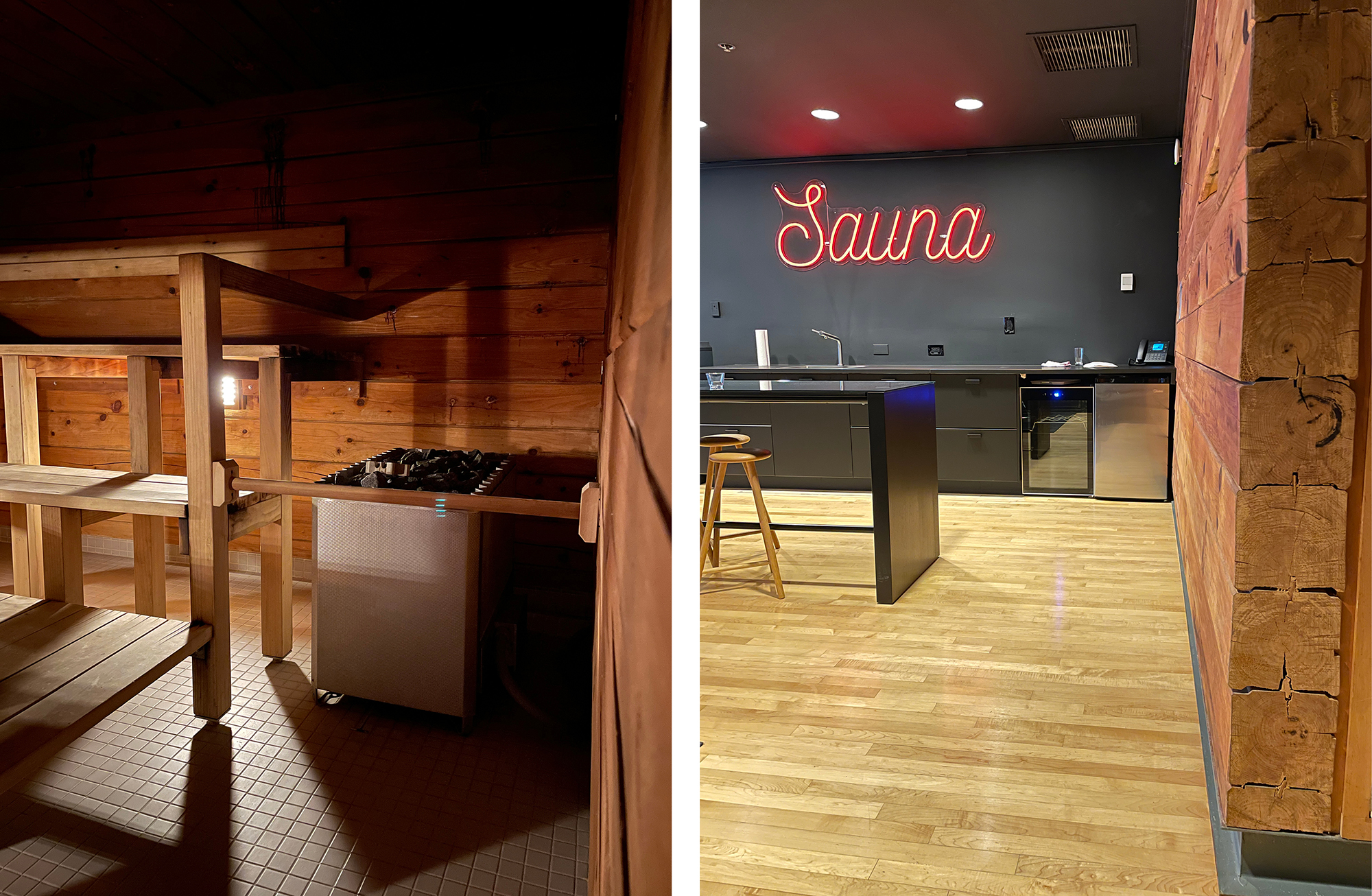
“I think people feel somehow it’s more intimate than going to a cocktail reception or even dinner at somebody’s house,” said Pasi Rajala, who runs the sauna series for the embassy. “It’s very informal, very laid back. I mean, you even strip off your clothes. You kind of get to know people in a new way.”
He added, “Of course, we talk shop, but we also talk about completely irrelevant things.”
Among those at one recent sauna outing in early January were Clemons, journalists from The New York Times and Bloomberg News and staffers from the office of Sen. Chuck Grassley (R-Iowa) and the Senate Small Business Committee. They noshed on Gravlax salmon and salmon mousse, Finnish beef meatballs and salads from the D.C. Scandinavian restaurant Mikko.
The British embassy promotes its events as opportunities to create a nonpartisan culture while enhancing diplomatic ties in difficult times. That’s proved particularly true amid the political chaos surrounding Brexit.
But that doesn’t mean they don’t seek a crowd of influencers. At a screening of the latest James Bond film last year at the Naval Heritage Center in downtown Washington, CIA Director Bill Burns — not exactly a fixture of the D.C. social scene — showed up.
“It’s a great opportunity to talk to senior people across Washington and the U.S. that we deal with on a regular basis and to bring them in a more friendly congenial setting to build that relationship,” said Heath, the embassy spokesperson. “It’s also a good way of having a good time with the people that we work with every day in the administration and in the Congress.”
Related posts:
Views: 0
 RSS Feed
RSS Feed















 April 28th, 2023
April 28th, 2023  Awake Goy
Awake Goy 
 Posted in
Posted in  Tags:
Tags: 
















